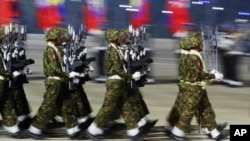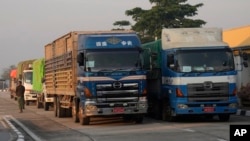Observers are expressing concern that deliveries of aid under Thailand’s new humanitarian aid program for war-torn Myanmar will be misused because of the role of the junta-run Myanmar Red Cross – which is distinct from the International Committee of the Red Cross.
U.N. agencies say fighting since the February 2021 coup has displaced some 2.4 million people and that a quarter of them are at risk of acute food insecurity. In a country of 54 million, the U.N. Office for the Coordination of Humanitarian Affairs says 18.6 million need aid. Myanmar’s military has been accused of "brazen" war crimes and crimes against humanity in its war against the resistance, and researchers estimate it has killed thousands of civilians.
The 10 Association of Southeast Asian Nations countries endorsed Thailand’s proposal for a "humanitarian corridor" to deliver aid to Myanmar through Thailand in January and the first convoy of 10 trucks, bearing 4,000 aid packages of mostly food and water crossed into Myanmar on March 25 at the Thai border town of Mae Sot, where the Thai Red Cross handed the shipment over to its Myanmar counterpart.
Thai officials said at the handover ceremony the packages would reach some 20,000 people displaced around three towns in eastern Myanmar’s Karen state and that the program could expand to other areas if the first delivery went well.
However, aid groups and experts say relying on the military regime and affiliates, including the Myanmar Red Cross, to distribute aid to victims of the fighting puts the aid program at risk.
"This organization is handpicked and instructed by the military regime, so it is not a good idea [for them] to hand over the assistance to ... the victims of the military regime," said Sann Aung, executive director of the New Myanmar Foundation, a charity on the Thai-Myanmar border that helps families that have fled the fighting.
Thailand’s Foreign Affairs Ministry, which is spearheading the program, refused VOA’s requests for an interview.
Its reliance on the Myanmar Red Cross to dispense the deliveries inside Myanmar has many aid experts worried.
Adelina Kamal, a former head of ASEAN’s aid agency, the ASEAN Coordinating Center for Humanitarian Assistance, said any aid outfit run by Myanmar’s military regime could not be trusted to dispense the aid fairly.
"In a conflict and crisis like Myanmar, how the aid is being given and who is behind the aid are often much more important than the aid itself. And if it is actually delivered by the one who initiated the crisis in the first place, there is a big probability that it is actually used as a tool in gaining popularity or ... showing that they’re trying to help the population that they’ve tried to kill," she said.
Kamal and others fear the junta may also "weaponize" the aid by directing it to communities it favors and away from those it does not. Many if not most of the displaced have taken shelter in parts of the country under the control of the armed groups the junta is fighting.
"When we talk about weaponization of aid, it can actually come in various forms ... for example blocking access for aid, which actually was done by the military after Cyclone Mocha hit Rakhine state, or selecting who actually should receive the aid or targeting how and where the aid should be actually provided," Kamal said.
A month after Cyclone Mocha slammed into western Myanmar’s Rakhine state in May of last year, the U.N. said the regime abruptly cut off humanitarian access to the area, "crippling life-saving aid distributions to affected communities."
Sann Aung agreed that Myanmar’s Red Cross lacks the independence needed to ensure the aid will reach those who need it most.
"Humanitarian assistance ... must be sent to the targeted areas without bias, without preference to any organization or anybody. But the Burma Red Cross, they are biased, they have to follow the instructions of the military regime," he said, calling Myanmar by its former name.
"So, we are very afraid that humanitarian assistance can be used, for example, [for] the people that are supporting the military regime or ... cronies," he added.
Thailand has said ASEAN’s aid agency would monitor the deliveries to ensure the aid is doled out fairly.
Kamal, though, who ran the agency for four years until 2021, said it is ill-equipped for the role by design.
She said the agency is geared toward responding to natural disasters, not political crises like the one in Myanmar. Having ASEAN state officials on the agency’s governing board, including officials from Thailand and Myanmar’s junta, she said, means it is unlikely to be critical if significant problems arise.
Thailand says its aims for the aid corridor include encouraging peace talks between the junta and resistance.
Both sides have rejected any compromise to date, and the key role of the Myanmar Red Cross in the aid corridor is unlikely to turn the thinking of the resistance around, said Surachanee Sriyai, a visiting fellow at Singapore’s ISEAS-Yusof Ishak Institute based in Thailand.
"They’re saying this is for humanitarian purposes, for humanitarian assistance. But when you do that and working with the Myanmar Red Cross — which everybody knows by now that this is part of the junta-controlled apparatus — how are you going to facilitate trust from the ethnic groups or what you would now call the resistance ... forces?" she said.
"That trust cannot be created and it cannot be forced by external actors," she added.
Myanmar’s so-called National Unity Government, a shadow government mainly including political leaders ousted by the coup and aiming to oust the junta, said in a statement to VOA that they "truly appreciate" Thailand’s new aid corridor.
However, lasting peace will come to Myanmar only when most of the population’s "fundamental grievances against military dictatorship are credibly addressed," the NUG’s Ministry of Humanitarian Affairs added.
It did not suggest kicking the Myanmar Red Cross out of the aid corridor entirely but proposed a "parallel" plan involving the full cooperation of resistance groups as well to make sure the aid is distributed based strictly on need.
Aid groups and experts have echoed the need to involve the NUG, armed resistance and nongovernment charities on both sides of the border to ensure the aid reaches the most desperate and vulnerable.






